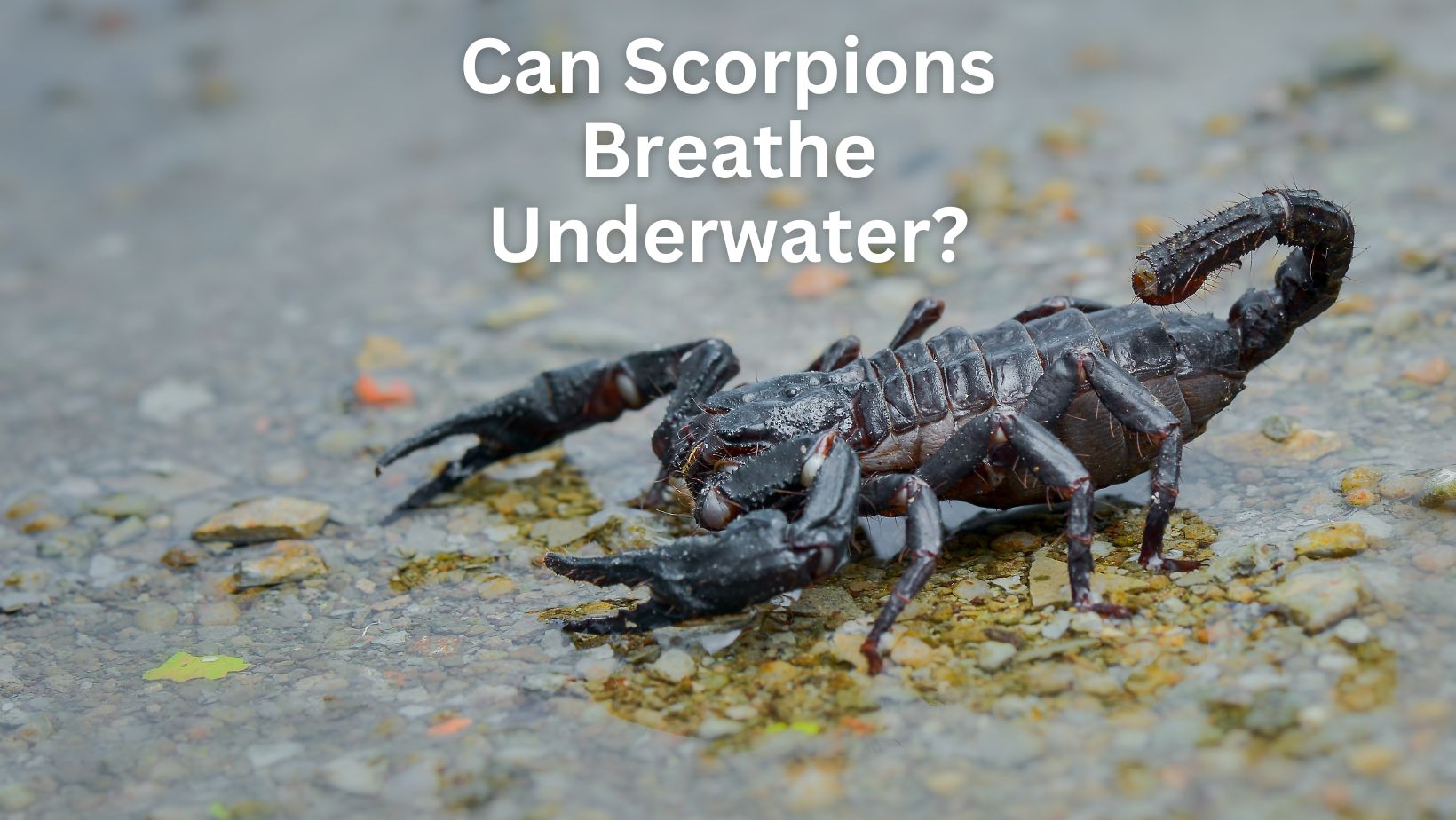Scorpions cannot breathe underwater as they are terrestrial arachnids adapted to life on land. They do not possess specialized respiratory structures for extracting oxygen from the water like aquatic organisms do.
However, The book lungs also allow scorpions to capture as much air as possible during air exchange. This huge air store also permits scorpions to live and hold their breath beneath for up to 6 days.
Scorpions have a respiratory system that relies on structures called book lungs, which are located in the abdominal area. These book lungs consist of thin lamellae (plates) that are highly vascularized, allowing oxygen exchange to occur. The scorpion breathes by moving its body to facilitate air movement through the book lungs, where oxygen is absorbed, and carbon dioxide is released.
While scorpions are not equipped to breathe underwater, they can survive in environments with high humidity levels, such as rainforests or desert habitats where moisture is present. They can tolerate damp conditions for a certain period but cannot live submerged in water for an extended time.
It is important to note that while scorpions can adapt to various environmental conditions, they primarily rely on breathing air and are not equipped for underwater respiration.
Can A Scorpio Swim?
Scorpions are not natural swimmers and are not adapted for swimming like aquatic animals. Their anatomy and physiology are primarily designed for living on land. While scorpions can tolerate damp or moist conditions, they do not have specialized swimming adaptations.
If a scorpion finds itself in water, it may attempt to move its legs paddling to stay afloat or reach a nearby surface. However, their ability to swim or navigate through water is limited and often inefficient.
Scorpions are better equipped for crawling and maneuvering on land, where they can use their specialized legs and claws to move effectively. Their bodies are adapted for terrestrial environments, with respiratory structures designed for air breathing.
It is important to note that scorpions are generally found in arid regions and prefer dry habitats. While they may encounter water in certain situations, their natural behavior and survival strategies are not centered around swimming.
What Happens To Scorpions In Water?
When scorpions come into contact with water, several things can happen:
- Immobility: Scorpions are not well-suited for aquatic environments, and being in water can impede their movement. They may become immobilized or struggle to navigate through the water.
- Loss of Oxygen: Scorpions breathe through specialized respiratory structures called book lungs, which rely on air for respiration. When submerged in water, they are unable to access oxygen, leading to a deprivation of this vital gas.
- Difficulty in Respiration: Scorpions are not adapted for underwater respiration. Their exoskeleton and respiratory system are designed for air breathing. Water can interfere with their ability to breathe properly, causing respiratory distress.
- Vulnerability to Predators: Water can expose scorpions to additional risks, including predators better adapted to aquatic environments. They may become more susceptible to predation when in water.
- Drowning: If scorpions cannot escape from the water, prolonged submersion can lead to drowning. Their ability to survive underwater for extended periods is extremely limited.
It is important to note that scorpions are terrestrial creatures whose physiology is not suited for life in water. They prefer dry environments and have evolved to thrive in arid conditions.
If you encounter a scorpion in water, it is best to remove it safely and place it back on dry land to ensure its well-being.
Can Scorpions Live in Pool? If Yes, How Many Days
If a scorpion accidentally falls into a pool, it will likely struggle to stay afloat due to its limited swimming ability. Scorpions can drown if they cannot reach a safe surface to climb out of the water.
The survival time of a scorpion in a pool can vary depending on factors such as the specific species, temperature, and other environmental conditions. Generally, scorpions are not equipped to survive for prolonged periods in water. They rely on air for respiration and are adapted to living on land.
If you find a scorpion in a pool, it is advisable to remove it safely and place it back on dry land. Avoid handling scorpions directly and use appropriate precautions to prevent stings.
Maintaining pool safety and preventing scorpions or other creatures from entering the pool area is important to ensure a safe and enjoyable swimming environment.
How Long Can A Scorpion Survive Without Water?
Scorpions are adapted to survive in arid environments and have developed various physiological and behavioral mechanisms to conserve water. They can tolerate long periods without water and can survive for several months without drinking.
The exact duration that scorpions can survive without water depends on several factors, including the species, age, temperature, humidity levels, and the availability of alternative water sources, such as the moisture content in their food.
In general, scorpions can endure without direct water intake because they obtain moisture from their prey, such as insects or other small creatures. Additionally, they can conserve water by reducing their metabolic rate and becoming more inactive during periods of water scarcity.
While scorpions are highly resilient to arid conditions, it is important to note that their ability to survive without water has limits. Extreme and prolonged water deprivation can eventually lead to dehydration and adversely affect their health and overall survival.
Providing access to water sources, such as shallow bowls or damp areas, can help support the well-being of pet scorpions in captivity. In the wild, scorpions have developed adaptations to seek out moisture in their environments, such as burrowing or hiding in crevices to conserve water.
Remember that specific scorpion species may have varying water requirements, and it is always beneficial to research the specific needs of the species you are interested in or responsible for caring for.
